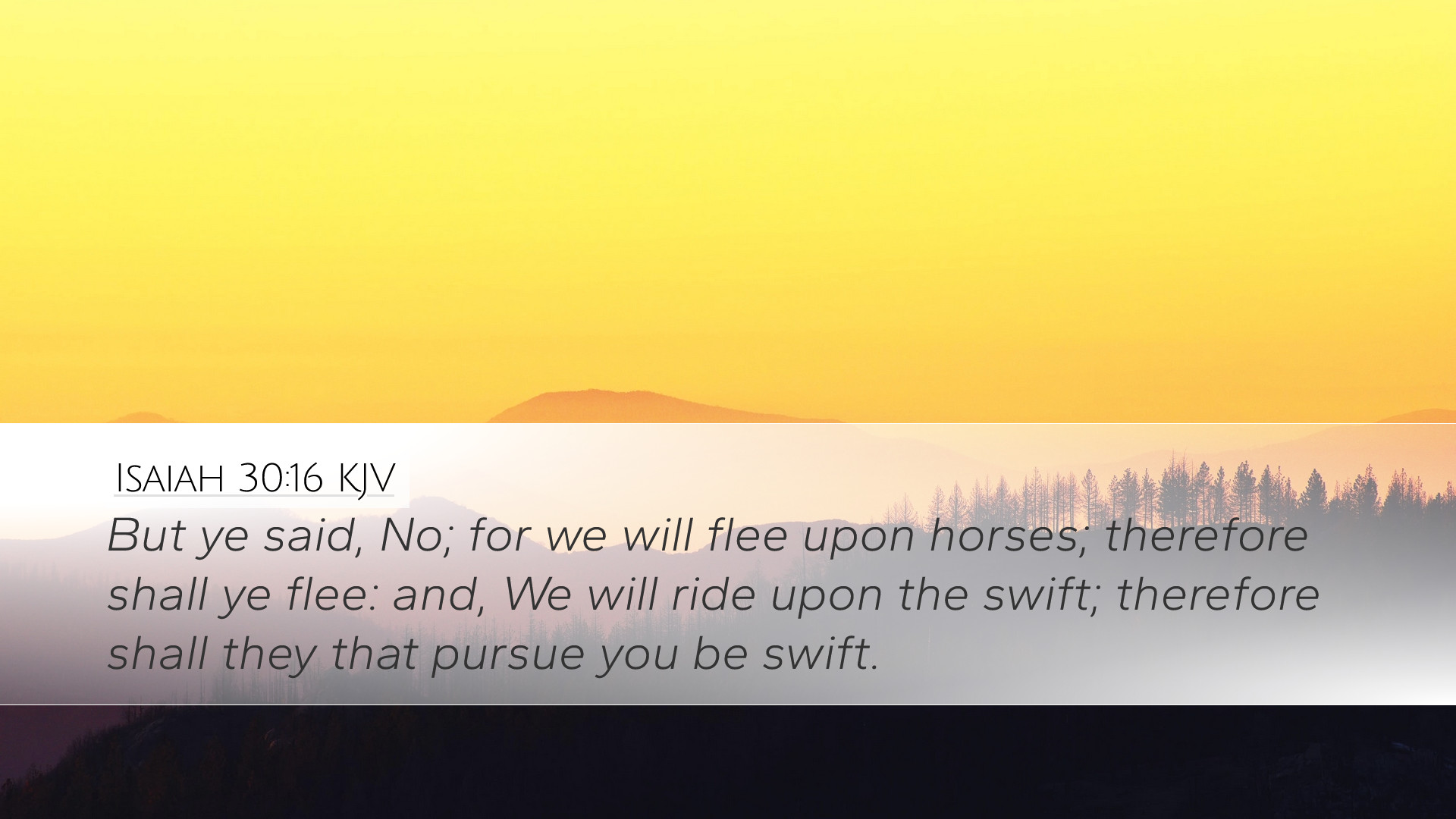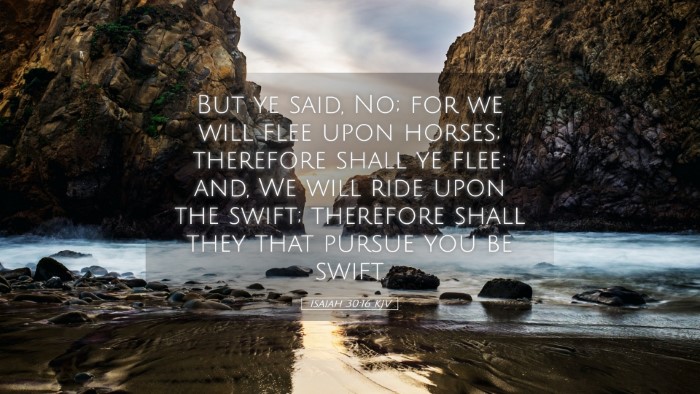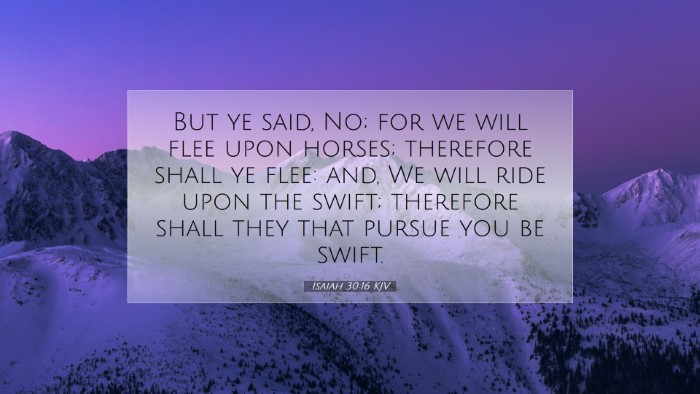Commentary on Isaiah 30:16
Verse: "But ye said, No; for we will flee upon horses; therefore shall ye flee: and, We will ride upon the swift; therefore shall they that pursue you be swift."
Introduction
Isaiah 30:16 provides a glimpse into the heart of Israel's rebellion against God’s providence and the resulting consequences of their choices. This verse is pivotal in understanding the themes of reliance and rebellion that dominate the text of Isaiah. It reflects not only historical circumstances but also enduring spiritual truths applicable to God's people throughout the ages.
Contextual Background
The Book of Isaiah was penned during a turbulent time in Israel's history. The nation was facing impending threats from powerful empires, particularly the Assyrians. The Israelites, rather than turning to the Lord for deliverance, sought aid from Egypt, demonstrating a lack of faith and a reliance on worldly solutions.
This chapter addresses the folly of their trust in man instead of God, juxtaposing divine wisdom with human strategies. Matthew Henry observes that the people’s refusal to heed divine counsel demonstrates a predisposition to lean on their understanding and security rather than God’s guiding hand.
Zion's Approach to Deliverance
Rejection of Divine Wisdom: The phrase “But ye said, No” captures the essence of Israel's obstinacy. Despite the tender invitations of divine mercy and guidance, they persist in their unwillingness to follow God’s ways. Albert Barnes remarks that the core issue was a refusal to trust in God's promises and a preference for immediate, tangible solutions.
Illusion of Safety: The sentiment of fleeing upon horses signifies a reliance on swift and powerful means of escape; however, this reliance is misguided. Adam Clarke elucidates that horses represent human strength and capability, which are ultimately insufficient against divine judgment. This reliance reflects a deeper theological truth—when humanity chooses to disregard God's ways, they inherently embrace futility.
Theological Insights
-
Human vs. Divine Autonomy:
The theological tension between human autonomy and divine sovereignty is starkly apparent in this verse. Isaiah critiques the tendency to seek self-preservation through human means instead of submitting to God's providence. The resultant swift ouster by adversaries serves as a sober reminder of the consequences of misplaced trust.
-
The Role of Consequences:
The statement “therefore shall ye flee” is not merely predictive but emphasizes the consequences of their choices. Henry points out that divine warnings are often met with disbelief, leading to inevitable repercussions. The swift pursuit by enemies symbolizes the urgency and severity of judgment against those who default on trusting God.
-
Contrast of Trust:
This verse serves as a contrast to the happiness and security found in trusting God. The encouragement for reliance on divine strength serves to uplift the faithful and caution against disobedience. Clarke underscores how God calls His people to remain steadfast, assuring them that deliverance through divine means far exceeds anything achievable through human endeavors.
Practical Applications
For pastors, students, and scholars, this verse offers profound insights into the nature of faith and reliance upon God. In contemporary terms, the lessons derived from Isaiah 30:16 challenge modern believers to reflect on their own sources of security and trust. Are we, like Israel, tempted to seek alternative solutions when faced with challenges, or do we lean into God's provision and sovereignty?
Individuals are encouraged to self-examine their responses to adversity. The allure of worldly solutions is strong; nevertheless, they are fleeting and ultimately deceptive. Pastoral applications can draw on this narrative to guide congregations towards a more profound dependence on God's word, encouraging them to engage with Scripture during times of difficulty.
-
The Call to Trust:
This passage is a clarion call for faith in the face of uncertainty. It compels the believer to cultivate trust in divine wisdom, echoing Proverbs 3:5-6, which implores us to trust in the Lord with all our heart and lean not on our understanding.
-
Resilience in Faith:
The faithful response to challenges is to embrace resilience, recognizing that true strength originates from reliance on God. In cultivating this posture, believers find both comfort and empowerment in navigating life's uncertainties.
-
Engaging in Prayer:
Engaging with the Lord in prayer invites divine intervention. Reflection on Isaiah’s rejection of God’s counsel encourages contemporary believers to seek God earnestly, asking for wisdom and guidance amidst confusion and turmoil.
Conclusion
Isaiah 30:16 stands as a profound reminder of the dangers of misplaced trust and the folly of rejecting divine guidance. The collective insights from Matthew Henry, Albert Barnes, and Adam Clarke present a holistic understanding of the text, leading to a robust application for today’s believers. As God’s people reflect on their own lives, the lessons of this verse guide them back to the path of faithful dependence on the Lord, who provides true safety and deliverance.


